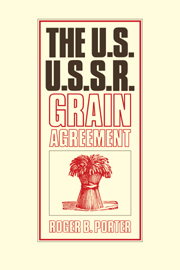Book contents
- Frontmatter
- Contents
- Foreword
- Preface
- List of acronyms used in the text
- 1 Introduction
- 2 U.S.–Soviet grain trade before 1974
- 3 The 1974 experience
- 4 The Russians return
- 5 First steps
- 6 A strategy emerges
- 7 Agreement to seek a long-term arrangement
- 8 Refining the details
- 9 Ebbing leverage: the waiting game
- 10 Evaluations
- 11 Reflections
- Epilogue
- Appendices
- Bibliography
- Index
- Frontmatter
- Contents
- Foreword
- Preface
- List of acronyms used in the text
- 1 Introduction
- 2 U.S.–Soviet grain trade before 1974
- 3 The 1974 experience
- 4 The Russians return
- 5 First steps
- 6 A strategy emerges
- 7 Agreement to seek a long-term arrangement
- 8 Refining the details
- 9 Ebbing leverage: the waiting game
- 10 Evaluations
- 11 Reflections
- Epilogue
- Appendices
- Bibliography
- Index
Summary
This book is about the negotiation of an international agreement. It focuses on the process of decision making within the executive branch and the interaction of individuals and ideas in shaping policy over time. In tracing the sequence of events it reveals that formulating a policy and implementing it are part of a single tapestry involving a multitude of decisions.
The U.S.–U.S.S.R. grain agreement played an important role in the Ford administration's relations with the American farm community and with the Soviet Union. Its importance was renewed during the Carter administration with the January 1980 embargo on grain for the U.S.S.R. The epilogue recounts the events leading up to the embargo and provides an opportunity to contrast the decision-making styles of two presidents and their administrations. The negotiation of the agreement and the subsequent embargo illustrate how intertwined foreign and domestic economic policy have become.
These episodes contain the seeds of many lessons for policy makers – lessons about developing and articulating policies and lessons about the effectiveness of economic sanctions and the limits of leverage.
This volume is intended for scholars and government officials; for foreign policy and agricultural policy specialists; for students taking courses on the presidency, U.S.–Soviet relations, and business and government; and for general readers interested in what the process of advising the president looks like from inside the White House and how it varied across two administrations.
- Type
- Chapter
- Information
- The U.S.-U.S.S.R. Grain Agreement , pp. xiii - xivPublisher: Cambridge University PressPrint publication year: 1984

